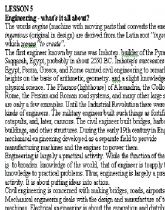Ťahák: Anglicky jazyk 2
Skryť detaily | Obľúbený- Kvalita:74,5 %
- Typ:Ťahák
- Univerzita:Technická univerzita v Košiciach
- Fakulta:Fakulta výrobných technológií so sídlom v Prešove
- Kategória:Jazyky
- Podkategória:Angličtina
- Predmet:Anglický jazyk 2
- Študijný program:Riadenie výroby
- Autor:gretka19
- Ročník:2. ročník
- Rozsah A4:2 strán
- Zobrazené:1 616 x
- Stiahnuté:0 x
- Veľkosť:0,1 MB
- Formát a prípona:MS Office Word (.doc)
- Jazyk:anglický
- ID projektu:37328
- Posledna úprava:08.05.2011
LESSON 5
Engineering - what's it all about?
The words engine (machine with moving parts that converts the energy) and ingenious (original in design) are derived from the Latin root "ingenerare", which means "to create". The first engineer known by name was Imhotep. builder of the Pyramid at Saqqarah, Egypt, probably in about 2550 BC. Imhotep's successors in ancient Egypt, Persia, Greece, and Rome carried civil engineering to remarkable heights on the basis of arithmetic, geometry. and a slight knowledge of physical science. The Pharaos (lighthouse) of Alexandria, the Collosseum in Rome, the Persian and Roman road systems, and many other large structures are only a few examples. Until the Industrial Revolution there were only two kinds of engineers. The military engineer built such things as fortifications, catapults, and, later, cannons. The civil engineer built bridges, harbours, buildings, and other structures. During the early 19th century in England mechanical engineering developed as a separate field to provide manufacturing machines and the engines to power them. Engineering is largely a practical activity. While the function of the scientists is to broaden knowledge of the world, that of engineer is toapply this knowledge to practical problems. T...
Engineering - what's it all about?
The words engine (machine with moving parts that converts the energy) and ingenious (original in design) are derived from the Latin root "ingenerare", which means "to create". The first engineer known by name was Imhotep. builder of the Pyramid at Saqqarah, Egypt, probably in about 2550 BC. Imhotep's successors in ancient Egypt, Persia, Greece, and Rome carried civil engineering to remarkable heights on the basis of arithmetic, geometry. and a slight knowledge of physical science. The Pharaos (lighthouse) of Alexandria, the Collosseum in Rome, the Persian and Roman road systems, and many other large structures are only a few examples. Until the Industrial Revolution there were only two kinds of engineers. The military engineer built such things as fortifications, catapults, and, later, cannons. The civil engineer built bridges, harbours, buildings, and other structures. During the early 19th century in England mechanical engineering developed as a separate field to provide manufacturing machines and the engines to power them. Engineering is largely a practical activity. While the function of the scientists is to broaden knowledge of the world, that of engineer is toapply this knowledge to practical problems. T...

